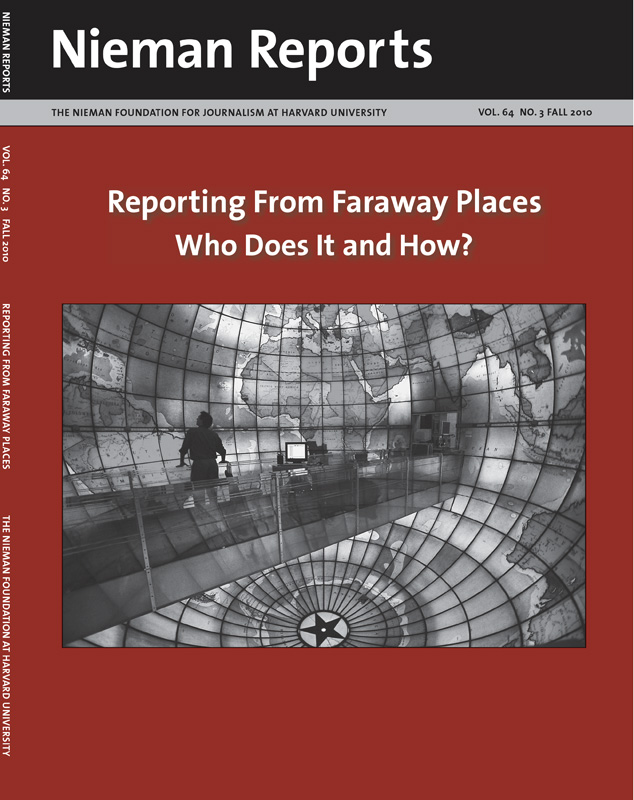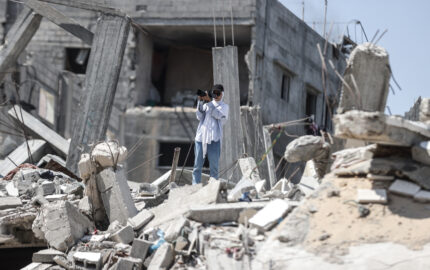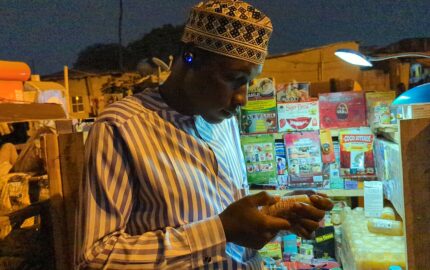Some invitations are hard to refuse. The one that professors Sandra Earley and Phelps Hawkins sent me was especially enticing. I’d spend a week in March teaching journalism at American University in Bulgaria (AUBG), working in classrooms in what used to be the headquarters of the local Communist Party, spending time with students who come from countries with virtually no tradition of free speech. Located in Blagoevgrad (Blago, for short) which is about a two-hour drive from the capital city of Sofia, AUBG was founded in 1991, soon after the fall of Communism. The university enrolls more than 1,000 students, just over half of whom come from countries outside Bulgaria. Classes are taught in English.
Teaching journalism in a post-Soviet bloc country is challenging because the concept of openly speaking your mind is still foreign, despite the fall of Communism more than 20 years ago. A student from Turkmenistan told how the dictator named the months of the year after members of his family. A Bulgarian student talked about statues disappearing and how she never knew who would be honored in the town square one day and replaced the next. Coming from places of secrecy and shifting sands, it is not so easy for these young people to imagine the free trade in barbs and opinions that we enjoy in Western-style media, even if even if it is sometimes fraught and imperfect.
Here, we worry about whether journalism has a future; in Blago, the students and their teachers worry about whether it has a present.
Sandra shared with me an incident that happened in her class when a diplomat visited. In an interview with a student, he said something that the student would only characterize as “harsh.” This student refused to tell Sandra any more about even the content of their conversation because of feeling the need to protect the diplomat. Nor would this student consider having what he said be published. Sandra could not begin to imagine what this visiting dignitary had told the student. Only after much prodding did the student confide, in a soft halting voice that almost choked on its own fearfulness, that the diplomat had said that it might well be in Bulgaria’s best interest to more openly promote the rights of gays, women and the Roma.
“I find the anecdote rather sweet and, unfortunately, typical,” Sandra told me. “Students from the former Soviet republics don’t seem to feel entitled to information as journalists or as citizens. They often ask permission when they don’t need to. When they ask for information, particularly from public officials, they don’t expect to get it. They expect to be told no, with no explanation, and public officials are often only too ready to fulfill their expectations. Student reporters seem to have a hard time understanding that they stand in the place of their readers and are entitled to information to pass on to citizens via the media.”
When I told the students about a column I’d written in The Boston Globe giving President Obama advice about what he should do and how he should conduct himself during his vacation last year on Martha’s Vineyard, they were wide-eyed.
“You mean it’s OK in your country to tell a leader what to do?” a few of them asked.
“Of course it is,” said Sandra. “We have an expression in English, ‘A cat can look at a king.’ ” She explained that no one is so important that an ordinary person cannot look at him or her. When she asked if any of their countries had a similar saying, the students offered blank looks. Where they come from, cats can gaze upon cats. (Maybe mice too, if they are lucky.)
My advice to Obama was jocular in spirit. I shared excerpts and then Sandra and I suggested that they come up with their own directives should Obama ever visit their countries.
One evening I gave a talk in the library and I hoped the students who came were drawn there by more than just the promise of refreshments afterward: “White wine, red wine, and water.” Hearing them ask questions convinced me that they were. One student asked if I regretted being a journalist.
This question took me by surprise. “Regret? Oh, no,” I answered, “Just the opposite.”
Later, I asked Sandra what she thought prompted the question. “Probably a variety of things. It contains an undercurrent of something very Eastern European and post-Soviet, a kind of fatalism or regret that is almost a default position in that culture. Where these kids come from, journalism pays next to nothing. You can get into a lot of trouble for doing it. There is no culture of a free and open exchange. The idea of it as a profession is frightening.”
But, she added, these students are trying. “Baby steps,” she sighed.
As if to prove her point, after I left, Phelps was in touch with the following message: “I just received the following e-mail from one of my freshmen students. Isn’t it dear?” Here’s the e-mail:
It gets to you, Bulgaria. It is isolated. The terrain is a perpetual challenge. It has a veneer of mystery in its silence, of a vast hidden bank of unspoken thoughts and dreams.
Even after my short visit, it lives on. I will always take cheer from the answers the students came up with in the basic newswriting class when we asked them to offer their own advice to President Obama if he were to tour their homelands. A Bulgarian student said, “Do not be surprised by bad roads and people always frowning.”
Other Bulgarian students quickly added that once the president recovered from those perceptions, he should explore the Seven Rila Lakes and watch a traditional folk dance and he would definitely see some smiles. He should also enjoy some rose petal jam. And he should try some rakia, an anise-flavored spirit popular in the Balkans, as well.
A young man from Athens said, “Expect riots and protests if you go to Greece. This is Greece in general. It is not personal.” Another student: “In Russia, wintertime might be a bad idea. In good weather, go to St. Petersburg, not Moscow. St. Petersburg is real Russia. Try the Borscht.” A student from Kazakhstan said, “Go to private house for good dinner.”
As a group they agreed on several points. In certain countries Michelle Obama must wear a headscarf. “Religion,” a girl said in a quiet voice, “is very important.” But above all, the president, they said, should avoid looking like a tourist: “Mr. Obama, remember, no sandals with socks and no camera dangling from your neck,” one student advised. “In big crowds, watch the wallet. Wear something nice: Calvin Klein or Burberry. Be good looking.”
This wasn’t exactly hard-nosed reporting we were seeing. It was, however, one of those encouraging baby steps.
Madeleine Blais, a 1986 Nieman Fellow, teaches journalism at the University of Massachusetts in Amherst.
Teaching journalism in a post-Soviet bloc country is challenging because the concept of openly speaking your mind is still foreign, despite the fall of Communism more than 20 years ago. A student from Turkmenistan told how the dictator named the months of the year after members of his family. A Bulgarian student talked about statues disappearing and how she never knew who would be honored in the town square one day and replaced the next. Coming from places of secrecy and shifting sands, it is not so easy for these young people to imagine the free trade in barbs and opinions that we enjoy in Western-style media, even if even if it is sometimes fraught and imperfect.
Here, we worry about whether journalism has a future; in Blago, the students and their teachers worry about whether it has a present.
Sandra shared with me an incident that happened in her class when a diplomat visited. In an interview with a student, he said something that the student would only characterize as “harsh.” This student refused to tell Sandra any more about even the content of their conversation because of feeling the need to protect the diplomat. Nor would this student consider having what he said be published. Sandra could not begin to imagine what this visiting dignitary had told the student. Only after much prodding did the student confide, in a soft halting voice that almost choked on its own fearfulness, that the diplomat had said that it might well be in Bulgaria’s best interest to more openly promote the rights of gays, women and the Roma.
“I find the anecdote rather sweet and, unfortunately, typical,” Sandra told me. “Students from the former Soviet republics don’t seem to feel entitled to information as journalists or as citizens. They often ask permission when they don’t need to. When they ask for information, particularly from public officials, they don’t expect to get it. They expect to be told no, with no explanation, and public officials are often only too ready to fulfill their expectations. Student reporters seem to have a hard time understanding that they stand in the place of their readers and are entitled to information to pass on to citizens via the media.”
When I told the students about a column I’d written in The Boston Globe giving President Obama advice about what he should do and how he should conduct himself during his vacation last year on Martha’s Vineyard, they were wide-eyed.
“You mean it’s OK in your country to tell a leader what to do?” a few of them asked.
“Of course it is,” said Sandra. “We have an expression in English, ‘A cat can look at a king.’ ” She explained that no one is so important that an ordinary person cannot look at him or her. When she asked if any of their countries had a similar saying, the students offered blank looks. Where they come from, cats can gaze upon cats. (Maybe mice too, if they are lucky.)
My advice to Obama was jocular in spirit. I shared excerpts and then Sandra and I suggested that they come up with their own directives should Obama ever visit their countries.
One evening I gave a talk in the library and I hoped the students who came were drawn there by more than just the promise of refreshments afterward: “White wine, red wine, and water.” Hearing them ask questions convinced me that they were. One student asked if I regretted being a journalist.
This question took me by surprise. “Regret? Oh, no,” I answered, “Just the opposite.”
Later, I asked Sandra what she thought prompted the question. “Probably a variety of things. It contains an undercurrent of something very Eastern European and post-Soviet, a kind of fatalism or regret that is almost a default position in that culture. Where these kids come from, journalism pays next to nothing. You can get into a lot of trouble for doing it. There is no culture of a free and open exchange. The idea of it as a profession is frightening.”
But, she added, these students are trying. “Baby steps,” she sighed.
As if to prove her point, after I left, Phelps was in touch with the following message: “I just received the following e-mail from one of my freshmen students. Isn’t it dear?” Here’s the e-mail:
Hi, professor! I wonder why journalists write in one article two different points of view. Moreover, these two parts contradict each other. Is it because the journalists want to show us all the truth and all sides of this or that issue?
It gets to you, Bulgaria. It is isolated. The terrain is a perpetual challenge. It has a veneer of mystery in its silence, of a vast hidden bank of unspoken thoughts and dreams.
Even after my short visit, it lives on. I will always take cheer from the answers the students came up with in the basic newswriting class when we asked them to offer their own advice to President Obama if he were to tour their homelands. A Bulgarian student said, “Do not be surprised by bad roads and people always frowning.”
Other Bulgarian students quickly added that once the president recovered from those perceptions, he should explore the Seven Rila Lakes and watch a traditional folk dance and he would definitely see some smiles. He should also enjoy some rose petal jam. And he should try some rakia, an anise-flavored spirit popular in the Balkans, as well.
A young man from Athens said, “Expect riots and protests if you go to Greece. This is Greece in general. It is not personal.” Another student: “In Russia, wintertime might be a bad idea. In good weather, go to St. Petersburg, not Moscow. St. Petersburg is real Russia. Try the Borscht.” A student from Kazakhstan said, “Go to private house for good dinner.”
As a group they agreed on several points. In certain countries Michelle Obama must wear a headscarf. “Religion,” a girl said in a quiet voice, “is very important.” But above all, the president, they said, should avoid looking like a tourist: “Mr. Obama, remember, no sandals with socks and no camera dangling from your neck,” one student advised. “In big crowds, watch the wallet. Wear something nice: Calvin Klein or Burberry. Be good looking.”
This wasn’t exactly hard-nosed reporting we were seeing. It was, however, one of those encouraging baby steps.
Madeleine Blais, a 1986 Nieman Fellow, teaches journalism at the University of Massachusetts in Amherst.



